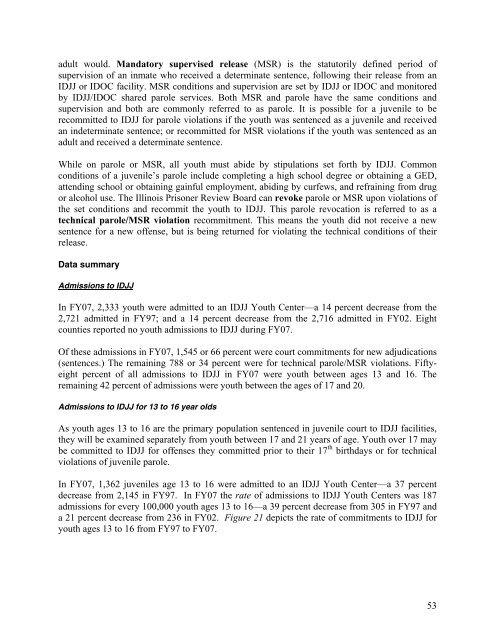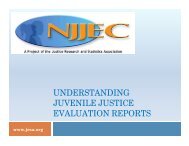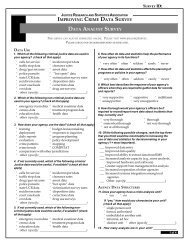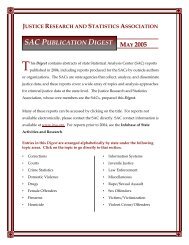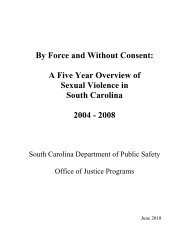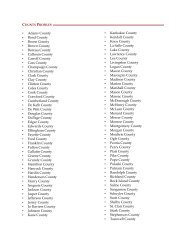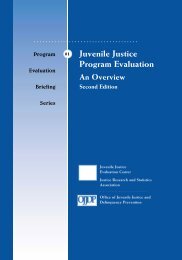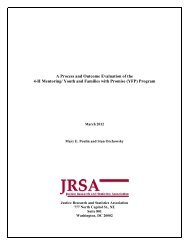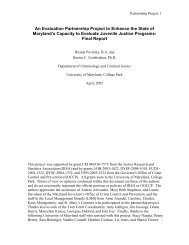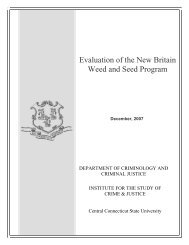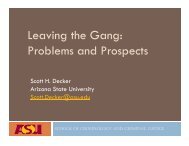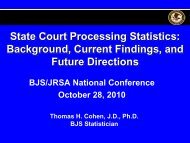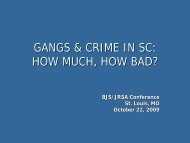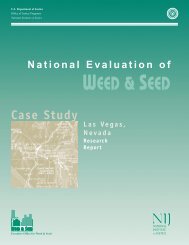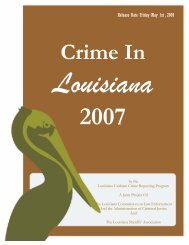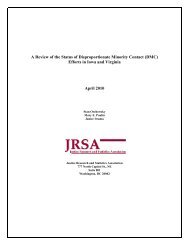Juvenile Justice System and Risk Factor Data - Illinois Criminal ...
Juvenile Justice System and Risk Factor Data - Illinois Criminal ...
Juvenile Justice System and Risk Factor Data - Illinois Criminal ...
Create successful ePaper yourself
Turn your PDF publications into a flip-book with our unique Google optimized e-Paper software.
adult would. M<strong>and</strong>atory supervised release (MSR) is the statutorily defined period of<br />
supervision of an inmate who received a determinate sentence, following their release from an<br />
IDJJ or IDOC facility. MSR conditions <strong>and</strong> supervision are set by IDJJ or IDOC <strong>and</strong> monitored<br />
by IDJJ/IDOC shared parole services. Both MSR <strong>and</strong> parole have the same conditions <strong>and</strong><br />
supervision <strong>and</strong> both are commonly referred to as parole. It is possible for a juvenile to be<br />
recommitted to IDJJ for parole violations if the youth was sentenced as a juvenile <strong>and</strong> received<br />
an indeterminate sentence; or recommitted for MSR violations if the youth was sentenced as an<br />
adult <strong>and</strong> received a determinate sentence.<br />
While on parole or MSR, all youth must abide by stipulations set forth by IDJJ. Common<br />
conditions of a juvenile’s parole include completing a high school degree or obtaining a GED,<br />
attending school or obtaining gainful employment, abiding by curfews, <strong>and</strong> refraining from drug<br />
or alcohol use. The <strong>Illinois</strong> Prisoner Review Board can revoke parole or MSR upon violations of<br />
the set conditions <strong>and</strong> recommit the youth to IDJJ. This parole revocation is referred to as a<br />
technical parole/MSR violation recommitment. This means the youth did not receive a new<br />
sentence for a new offense, but is being returned for violating the technical conditions of their<br />
release.<br />
<strong>Data</strong> summary<br />
Admissions to IDJJ<br />
In FY07, 2,333 youth were admitted to an IDJJ Youth Center—a 14 percent decrease from the<br />
2,721 admitted in FY97; <strong>and</strong> a 14 percent decrease from the 2,716 admitted in FY02. Eight<br />
counties reported no youth admissions to IDJJ during FY07.<br />
Of these admissions in FY07, 1,545 or 66 percent were court commitments for new adjudications<br />
(sentences.) The remaining 788 or 34 percent were for technical parole/MSR violations. Fiftyeight<br />
percent of all admissions to IDJJ in FY07 were youth between ages 13 <strong>and</strong> 16. The<br />
remaining 42 percent of admissions were youth between the ages of 17 <strong>and</strong> 20.<br />
Admissions to IDJJ for 13 to 16 year olds<br />
As youth ages 13 to 16 are the primary population sentenced in juvenile court to IDJJ facilities,<br />
they will be examined separately from youth between 17 <strong>and</strong> 21 years of age. Youth over 17 may<br />
be committed to IDJJ for offenses they committed prior to their 17 th birthdays or for technical<br />
violations of juvenile parole.<br />
In FY07, 1,362 juveniles age 13 to 16 were admitted to an IDJJ Youth Center—a 37 percent<br />
decrease from 2,145 in FY97. In FY07 the rate of admissions to IDJJ Youth Centers was 187<br />
admissions for every 100,000 youth ages 13 to 16—a 39 percent decrease from 305 in FY97 <strong>and</strong><br />
a 21 percent decrease from 236 in FY02. Figure 21 depicts the rate of commitments to IDJJ for<br />
youth ages 13 to 16 from FY97 to FY07.<br />
53


